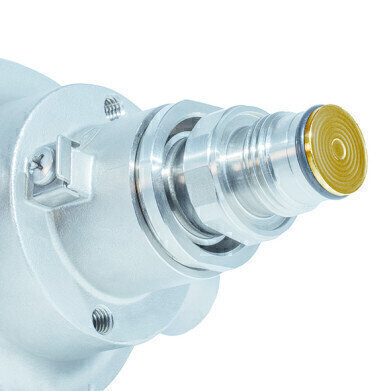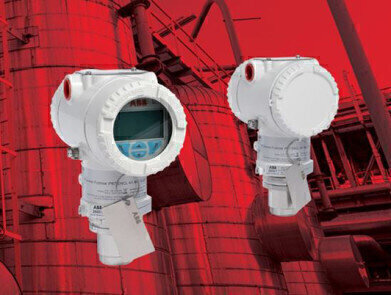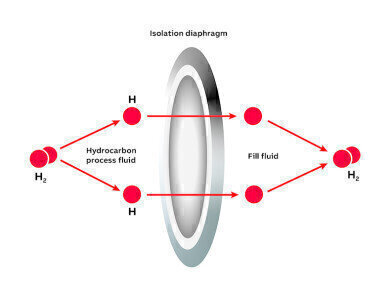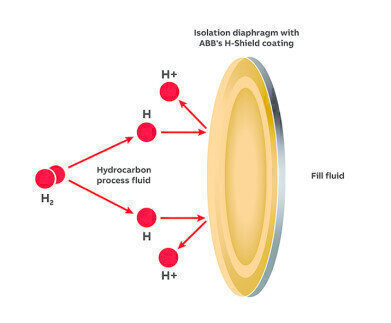-
 This image shows the H-shield coating on the diaphragm of a pressure transmitter
This image shows the H-shield coating on the diaphragm of a pressure transmitter -

-
 This image shows Hydrogen ions small enough to penetrate the diaphragm on the transmitter
This image shows Hydrogen ions small enough to penetrate the diaphragm on the transmitter -
 This image shows Hydrogen unable to penetrate the nano-coating provided by H-shield
This image shows Hydrogen unable to penetrate the nano-coating provided by H-shield
Measurement and Testing
Nano-coating tackles the issue of hydrogen permeation in pressure transmitters
Aug 15 2022
The oil and gas sectors rely heavily on pressure transmitters to maintain safe and efficient operations at industrial plants such as refineries and petrochemical plants. However, these transmitters often fail due to hydrogen permeation, which often goes undiagnosed. ABB have developed a new coating to deal with this problem economically and efficiently.
Hydrogen permeation occurs when conditions cause the molecule to split into two hydrogen ions, which are therefore small enough to pass through the molecular structure of the transmitter’s diaphragm. Having passed the diaphragm, the ions re-unite to create a larger hydrogen molecule that is too large to return through the diaphragm. The hydrogen then accumulates as it is trapped and diffuses into the transmitter’s fill fluid, affecting its performance. As time goes by the build-up of hydrogen will create a bulge in the diaphragm, which only becomes apparent on removing the transmitter.
Processes that involve high pressures of over 1,000 psi/68.95 bar or high temperatures exceeding 176°C/350°F are more likely to struggle with hydrogen permeation in pressure transmitters. These higher energy conditions increase the likelihood of hydrogen molecules transforming from a diatomic state into smaller hydrogen ions. In addition, these is the danger of atomic hydrogen forming through galvanic corrosion where the process has pipelines made from dissimilar materials.
ABB’s have developed a titanium-based binary nano coating, known as ‘H-Shield‘ to deal with this problem. The coating is applied using the Physical Vapour Deposition (PVD) process; this technique is widely used in a variety of industrial processes to apply high end coatings to metals. The surface of the diaphragm is covered with a protective coating with a uniform thickness throughout. Thanks to the H-Shield’s tight molecular structure it offers the highest level of resistance possible against hydrogen ions permeating the diaphragm, whilst still allowing it to move as pressure conditions change. ABB ran laboratory tests and discovered that the H-Shield offered as much as 20 times the protection against hydrogen permeation than materials such as gold and Hastelloy HC. The H-Shield also performed well in field tests where they withstood conditions where other manufacturers’ transmitters were failing and in need of replacement after 18 to 24 months.
H-Shield was trialled at a Canadian oil refinery, where they process North American and overseas crude oil brought in by ship, rail, and pipeline. The refinery has significant crude storage capacity for crude, intermediate and refined products and can also accommodate liquefied petroleum gas (LPG) in its pressurised storage vessels or tanks. They contacted ABB’s channel partner because they were having problems with hydrogen permeation leading to transmitter failure. An H-Shield 266 DP transmitter with remote seals was supplied and there have been no further problems – the transmitters have been performing precisely and reliably since 2016.
Gold and other precious metals have provided a good level of protection until now. However, new breakthroughs have lead pressure transmitters to perform more effectively in the field, helping organisations to reduce costs and unscheduled downtime and increase productivity.
Digital Edition
PIN 25.3 June/July
June 2024
Analytical Instrumentation - Recent Advances In Various Bench Scale Accelerated Oxidative Testing Methods For Fuels - Petrochemical Industry: Anton Paar Solutions Streamline Processes, Reduce H...
View all digital editions
Events
Jul 30 2024 Jakarta, Indonesia
Jul 30 2024 Jakarta, Indonesia
China Energy Summit & Exhibition
Jul 31 2024 Beijing, China
Jul 31 2024 Chengdu, China
Aug 05 2024 Moon Township, PA, USA

















